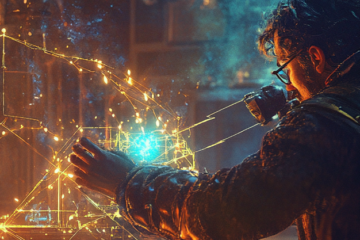As I get older I’m being forced to acknowledge that my physical body is not accepting my mental premise that I’m pretty much the same as I was when I was 18 years old.
I’m forced to rationalize more things to myself.
I tell myself I’m wiser though strangely slower to learn some new things. I have a slower metabolism while at the same time recalling the days I could eat anything and everything that passed within reach of my hands and mouth and suffer no ill consequences aside from occasional indigestion. I still have hair that hasn’t gone gray (yet), but either my forehead is getting taller or (*gasp*) my hairline might be receding. I can still play a good game of volleyball and jump pretty well, but I seem to walk a bit funny the next day and getting out of bed my ankles or perhaps my knees seem oddly pained. Oh, and I have full-grown kids, near adults where before that I used to have children then infants then … well, more intent then opportunity to explore the joys of the opposite sex.
All this has caused me to start to wrap my head around the fact that, to use a golf metaphor, which probably firmly places me with my elders, statistically I seem to be on the back nine of my life. More life behind me than I likely have ahead of me.
The time I have ahead of me will probably be marked more by the passing of my ability to do things I’ve taken for granted like playing volleyball without pain, jumping high without warming up, learning quickly, staying up till 2am programming something interesting, eating spicy foods and not suffering the punishments of my digestive tract.
Instead, I’m learning of the joys of Tums, ibuprofen and the reality that creating muscle mass becomes more difficult on the back nine of this course.
What else? Oh, yeah. I seem to forget things more easily. Names, things that I remembered five minutes before, what brought me in to the room I’m standing in while I try to reconstruct the last five minutes of thoughts to see what drew me here.
At the same time, I’m certainly thankful for where I am now. I’m healthy, happy and have purpose. I am loved and I love. So, all in all, not a bad deal.
This thought process also had me thinking about immortality.
Not the living forever part, though if I could choose to do that as my 25 year old self and still know what I know that might have some appeal. But, that’s really nothing more than a fun way to wile away a bit of time, like thinking about what you’d do if you won that $200M powerball lottery.
Failing science coming in the next 40 years and figuring out how to clone my body and create a 25-year old version of me that I can download in to, I’m left thinking about other demonstrable notions of immortality.
Before I go on, I want to make clear that I’m not even going to touch the spiritual part of this discussion. That’s not something I can prove or disprove. It’s a matter of faith and that’s a different discussion.
For the purposes of this discussion, let’s define terms. The dictionary defines immortality thusly: “the quality or state of being immortal: a: unending existence b: lasting fame”.
I’m going to define it a bit differently and talk about immortality in the sense of what we leave behind after we are gone from this world. Even if it’s not forever, immortality is what persists after we are gone.
With that in mind, I think there are three demonstrable forms of immortality that are worth thinking about.
They are: our children, the things we make and our acts.
Our Children
Our children are our most direct “product” in terms of literally leaving something of ourselves to persist and continue in the world. But, the same applies for adopted children since the impact a parent has on the child in terms of day-to-day interactions is at least as critical as the genetic component. It’s not Nature versus Nurture. It’s Nature plus Nurture.
We don’t get to pick which of our natural traits we get to pass on to our children, so there’s certainly a somewhat random melange there. They will likely receive both the worst and the best of us.
One of our main added values is in trying to help our children do better with what we’ve given them than we may have done ourselves.
Our children will grow up and become independent individuals that carry the legacy of our genetics as well as the everything we’ve tried to be as people and parents. Hopefully the net result of that is more positive than negative.
Scientists can, in some cases, trace the genetic drift of certain chromosomes which allows them to track characteristics back thousands of years to a time and place.
That’s certainly a certain kind of immortality. Someone was born with a mutation for red hair (likely multiple someones) and the characteristic persists today. Perhaps some characteristic of my genetic profile will persist hundreds or more years in to the future, albeit mixed with whatever comes in from elsewhere in future generations.
So, we see that while our children inherit (some might say suffer) the largest piece of our genetic legacy, that continues, albeit diluted, in to later generations.
Similarly, what we teach them about how to be in the world, right and wrong, how to handle disappointment, how to work hard, what’s truly important (to us). These, too, will persist in some form.
The difference is that later generations will largely be a random mix of genetic tendencies, but our children will consciously choose what and who to be. Or not to be.
We’re not doing genetic engineering of our offspring (yet), but generations have partaken in values engineering or behavioral engineering as we choose what to take from our parents and perpetuate in our own lives.
In the end, this form of immortality is one of the most direct ways to influence the world we leave behind. But it’s certainly not the only form.
Things We Make
There have always been people who created art in various forms, be it painting, poetry, music or any other form that has existed through history.
We know who painted the Mona Lisa, we know the Eiffel Tower was named after the guy who created it, most of us can probably quote a least a bit of poetry and hopefully the author, or a bit of Shakespeare or a few bars of a classic piece of music and the composer.
This is the most recognized form of immortality in the form of the Things We Make.
Will they persist forever? No, but they will certainly last long after the individual is gone.
But, you might say, everyone can’t be a DaVinci, Michaelangelo, Shakespeare or Mozart!
And, of course, you’d be right.
So, what, I would probably reply. Maybe you won’t create the next Eiffel Tower, but that doesn’t stop us from creating something that can live on past our time.
I have a couple pieces of wooden furniture and toys created by my step-Grandfather, Pappy. Each has a small brand on the bottom of them that says “Hand crafted by Pappy”.
When those pass on to my children or they give it to their children (one of them is a small stool shaped like a turtle with a cushion on the top), my kids will know that this came from Pappy. They may not have known him (he passed away before they were very old), but I will get the chance to tell them the story of how the stool came to be and how much Pappy loved making things for people. This is a form of immortality. He will live on in the things he made. Are they the Eiffel Tower? No, but watching my son sit on the turtle stool while learning to tie his shoes is a memory that is far more real to me and touches me deeper than when I stood in front of the Eiffel Tower. Is it impressive? Sure. But it lacks an emotional component that that little stool will always have. And that emotional connection will hopefully grow as my son passes that little stool down to his kids and they make their own stories and create their own connections to that piece of wood and stuffing.
Thanks for that, Pappy.
There’s been a movement afoot that I’ve noticed in last few years. People are Making more things. Average people. They’re learning skills in wood working, crafting, electronics. They’re taking things that other have built and twisting them in to new and amazing things.
You can read about this in great blogs like Make (http://blog.makezine.com).
Frankly anything that helps turn people from Consumers to Producers is a good thing for our world. And I’m not talking about producing more cars or *stuff*. I’m talking about the fact that a proportionally very small number of people Produce the material that the rest of the developed world Consumes. I’m talking about art, music, books, media in all its forms, games, etc. Think how many people passively absorb the results of the hard work of a relatively small number of producers. Millions see a movie that hundreds (perhaps thousands) of people made. Millions read a book that was written by a single person. The proportion of Consumers to Producers for media and art is skewed very heavily towards a reducing number of Producers and a growing number of Consumers.
Thousands of people lament how long it takes a popular author to write the next book in a beloved series. Millions consume that series. One person created it. If our society persists in creating a system that reduces the number of Producers down to a one to a million kind of ratio, it will become unsustainable. Or, rather, it will be the death of a variety of voices as the only choices available via mass media marketing are those where millions of Consumers pay for the output.
Makers are turning that around. They produce things. They Make things and music and art and words!
Certainly the Internet has helped facilitate that. It allows people to communicate from one-to-one or one-to-many. Bloggers can have audiences of a few family and friends or have thousands of people reading their material. One person can create a plan for something as simple as an Adirondack chair and share that on the Internet so that instead of just his chair, there are hundreds of chairs out there. And each person is welcome to tweak the design to suit their need when people open that design up to others.
That’s an immortality, too.
Personally, I’m a dilettante with intentions to improve in the Making space.
I write sometimes, though I’ve published nothing, yet. I’ve written computer software that was published in a book. I’ve created animations and I’ve had images I created on the computer featured in books. Not bad, but I can do better.
I believe we can all Make more than we do. Paint. Write. Draw. Learn the guitar. Create a game.
Maybe it is only seen locally or only by family, but the act of creation is an amazing thing. That energy gets transformed in to something that will persist. Maybe it persists in itself or maybe it influences someone or encourages them to make something themselves.
That act of creation can have far more impact than the work that went in to it. That’s immortality!
Our Acts
The final area where we have an ability to have an impact even after we are gone is in our acts.
This last is certainly more amorphous, less prone to easy measurement.
By our act, I mean the ways we touch, both intentionally and unintentionally, those around us in the world.
These can be as small as opening a door for someone or smiling at someone and asking them abou their day. And listening to the response like you care!
They can also be large. An endowment or scholarship fund. Think what you will of Bill Gates, but his Gates Foundation is likely to have a profound impact long after he is actively involved and likely long after he has left this world.
But, there’s much ground in the middle, too.
Think about someone who volunteers at a soup kitchen, or cleans up garbage in a community. What about a Big Brother, Big Sister or a Foster parent. These people have an effect from the very local, even to a single person, up to something as large as our local community. And those changes, those ripples that we introduce in the pond around us, can have profound impacts long after the act that caused that ripple.
You might recall the 2000 movie “Pay It Forward” where the main character had the idea of doing a good deed and asking the recipient rather than paying them back, to pay it forward to someone else in need. The ripples continue after the initial stone is dropped.
Finally
In the end, we all pass on and leave a legacy of some form. Few people manage to leave this earth without having affected someone in big and small ways, or made something that is left behind, or without having loved and been loved.
That’s a real sense of immortality. It’s tangible. We can wrap our heads and our hearts around it.
And, at the same time, it gives us something to strive for. It gives us a checkpoint that we can take to look at ourselves and ask questions about how we are living our lives, who we are touching, what are we making, what are we doing that makes some difference?
That kind of self-analysis, that mental and emotional check-in is an important opportunity to make sure that our life doesn’t just slip away from us between all the moments and days where we just do the next thing without thought, without reflection, without direction.
Time is an arrow and it can’t be stopped. Like Ferris Bueller said: “Life moves pretty fast. If you don’t stop and look around once in a while, you could miss it.”
Don’t miss yours.



0 Comments